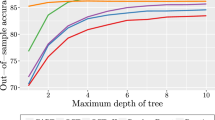Abstract
Survival analysis focuses on the prediction of failure time and serves as an important prognostic tool, not solely confined to medicine but also across diverse fields. Machine learning methods, especially decision trees, are increasingly replacing traditional statistical methods which are based on assumptions that are often difficult to meet. The paper presents a new global method for inducing survival trees containing Kaplan–Mayer estimators in leaves. Using a specialized evolutionary algorithm, the method searches for oblique trees in which multivariate tests in internal nodes divide the feature space using hyperplanes. Specific variants of mutation and crossover operators have been developed, making evolution effective and efficient. The fitness function is based on the integrated Brier score and prevents overfitting taking into account the size of the tree. A preliminary experimental verification and comparison with classical univariate trees was carried out on real medical datasets. The evaluation results are promising.
Access this chapter
Tax calculation will be finalised at checkout
Purchases are for personal use only
Similar content being viewed by others
References
Assel, M., Sjoberg, D.D., Vickers, A.J.: The brier score does not evaluate the clinical utility of diagnostic tests or prediction models. Diagn. Prognostic Res. 1(1), 1–7 (2017)
Bertsimas, D., Dunn, J., Gibson, E., Orfanoudaki, A.: Optimal survival trees. Mach. Learn. 111(8), 2951–3023 (2022)
Breiman, L., Friedman, J., Olshen, R., Stone, C.: Classification and Regression Trees. Wadsworth, Belmont, CA (1984)
Cho, H.J., Hong, S.M.: Median regression tree for analysis of censored survival data. IEEE Trans. Syst. Man Cybern. Part A Syst. Hum. 38(3) (2008)
Fleming, T.R., Harrington, D.P.: Counting Processes and Survival Analysis. Wiley (1991)
Freitas, A.A.: Data Mining and Knowledge Discovery with Evolutionary Algorithms. Springer, Heidelberg (2002). https://doi.org/10.1007/978-3-662-04923-5
Graf, E., Schmoor, C., Sauerbrei, W., Schumacher, M.: Assessment and comparison of prognostic classification schemes for survival data. Stat. Med. 18, 2529–2545 (1999)
Hothorn, T., Hornik, K., Zeileis, A.: Unbiased recursive partitioning: a conditional inference framework. J. Comput. Graph. Stat. 15(3), 651–674 (2006)
Hsich, E., Gorodeski, E.Z., Blackstone, E.H., Ishwaran, H., Lauer, M.S.: Identifying important risk factors for survival in patient with systolic heart failure using random survival forests. Circ. Cardiovasc. Qual. Outcomes 4(1), 39–45 (2011)
Jaeger, B.C., et al.: Oblique random survival forests. Ann. Appl. Stat. 13(3), 1847–1883 (2019)
Kaplan, E.L., Meier, P.: Nonparametric estimation from incomplete observations. J. Am. Stat. Assoc. 53, 457–481 (1958)
Kretowska, M.: Piecewise-linear criterion functions in oblique survival trees induction. Arif. Intell. Med. 75, 32–39 (2017)
Kretowski, M.: Evolutionary Decision Trees in Large-Scale Data Mining. SBD, vol. 59. Springer, Cham (2019). https://doi.org/10.1007/978-3-030-21851-5
Kundu, M.G., Ghosh, S.: Survival trees based on heterogeneity in time-to-event and censoring distributions using parameter instability test. Stat. Anal. Data Mining ASA Data Sci. J. 14(5), 466–483 (2021)
Kyle, R.A., et al.: A long-term study of prognosis in monoclonal gammopathy of undetermined significance. N. Engl. J. Med. 346(8), 564–569 (2002)
LeBlanc, M., Crowley, J.: Relative risk trees for censored survival data. Biometrics 48, 411–425 (1992)
LeBlanc, M., Crowley, J.: Survival trees by goodness of split. J. Am. Stat. Assoc. 88(422), 457–467 (1993)
Pintilie, M.: Competing Risks: A Practical Perspective, vol. 58. Wiley (2006)
Therneau, T.M.: Survival: Survival Analysis (2016). http://CRAN.R-project.org/package=survival. R package version 2.39
Therneau, T.M., Grambsch, P.M., Fleming, T.R.: Martingale-based residuals for survival models. Biometrika 77(1), 147–160 (1990)
Acknowledgement
This work was supported by Bialystok University of Technology under the grant WZ/WI-IIT/4/2023 founded by Ministry of Science and Higher Education.
Author information
Authors and Affiliations
Corresponding author
Editor information
Editors and Affiliations
Ethics declarations
Conflict of Interest
The authors have no competing interests to declare that are relevant to the content of this article.
Rights and permissions
Copyright information
© 2024 The Author(s), under exclusive license to Springer Nature Switzerland AG
About this paper
Cite this paper
Kretowska, M., Kretowski, M. (2024). Global Induction of Oblique Survival Trees. In: Franco, L., de Mulatier, C., Paszynski, M., Krzhizhanovskaya, V.V., Dongarra, J.J., Sloot, P.M.A. (eds) Computational Science – ICCS 2024. ICCS 2024. Lecture Notes in Computer Science, vol 14835. Springer, Cham. https://doi.org/10.1007/978-3-031-63772-8_33
Download citation
DOI: https://doi.org/10.1007/978-3-031-63772-8_33
Published:
Publisher Name: Springer, Cham
Print ISBN: 978-3-031-63771-1
Online ISBN: 978-3-031-63772-8
eBook Packages: Computer ScienceComputer Science (R0)




